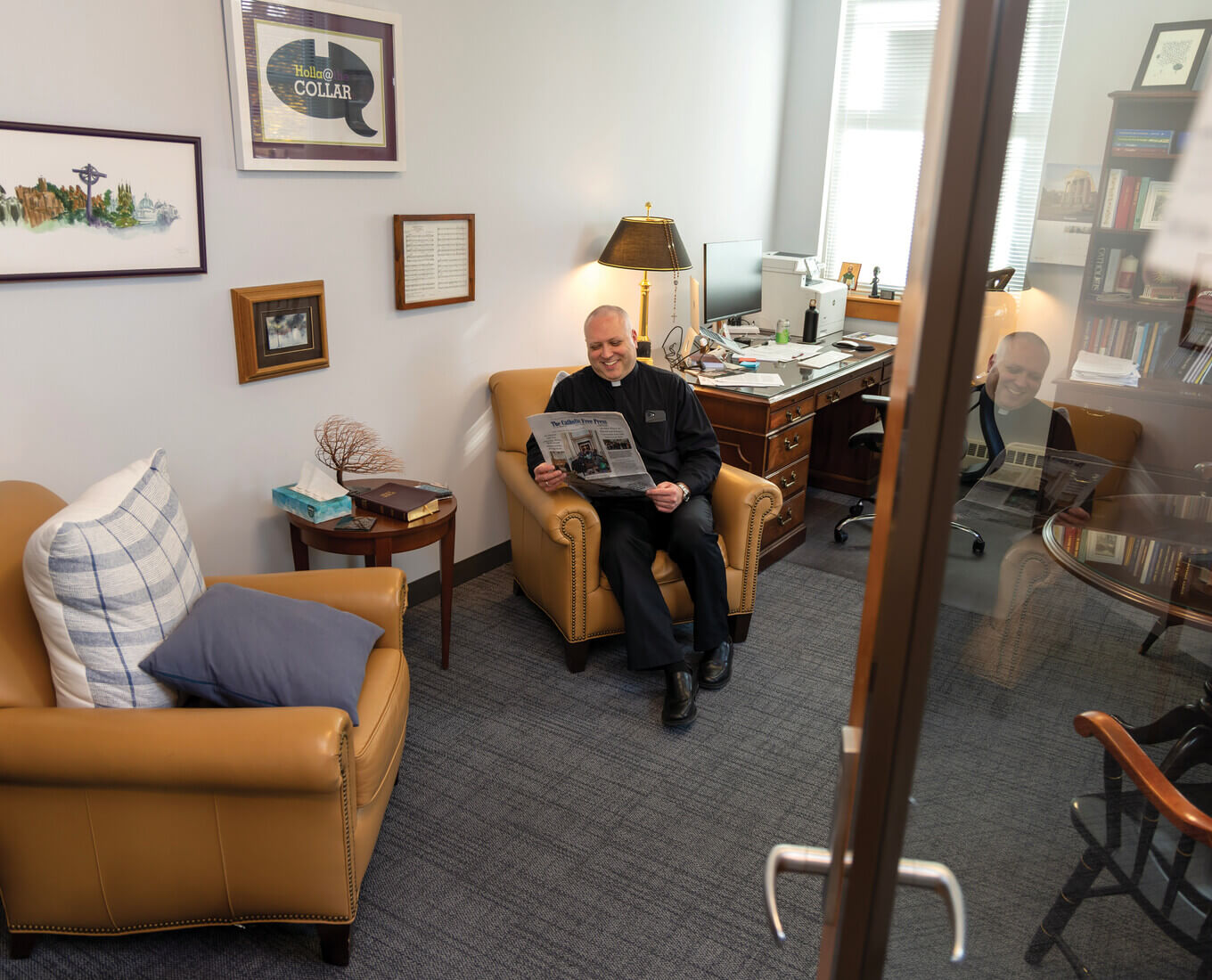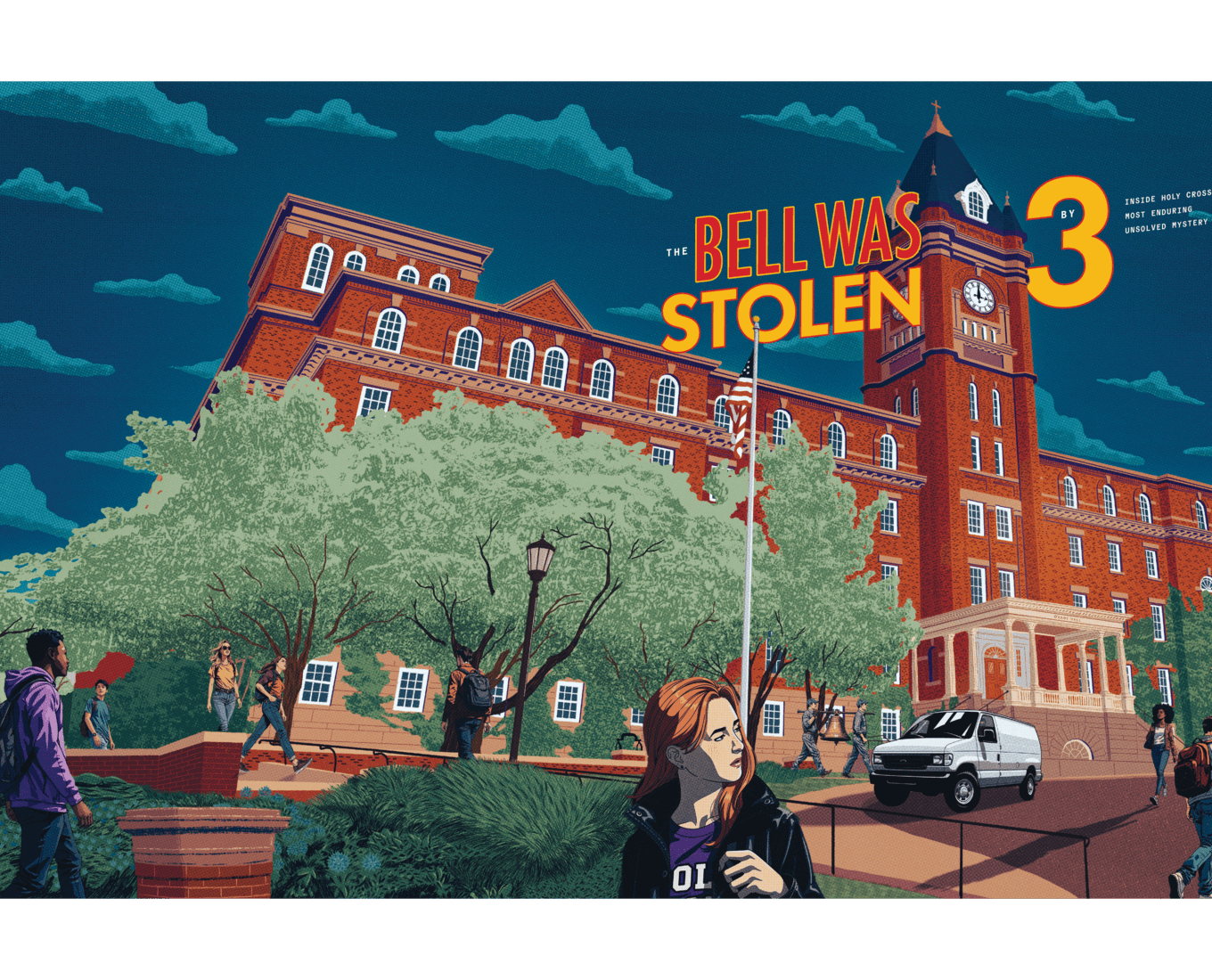On a sunny December afternoon over steaming cups of tea, Laurence Rosania paused, midsentence, in telling a tale from his childhood. Could he play “The Waltz of the Snowflakes” from “The Nutcracker?” he says.
He presses a button on his computer. Sounds of strings, flutes and piccolos surge.
“The Waltz of the Snowflakes” occurs at the end of Act I, where an ethereal-sounding children’s choir joins the dancers and musicians.
For Rosania, the scene recalls a different triumph: His professional debut at age 9 with the Philadelphia Boys Choir singing in the Pennsylvania Ballet Company’s annual performance of the Christmas classic.
Rosania turns the volume up. Close your eyes and you can see the ballerinas, glittering in their white tulle finery, as they dance in the forest. Then comes the chorus of boys’ voices. The effect is heavenly.
“In the full performance of ‘The Nutcracker,’ Tchaikovsky writes a small section in the snow scene where the sound of a boys’ choir appears out of nowhere. And it’s magical,” Rosania says. “That was my first, and most nerve-wracking, premiere, because the Academy of Music has five levels up to the balconies. We boys were on both sides of the house, 30 on each side.
“And the boys’ choir just starts singing in the middle of this snow scene,” he says. “But to do that, you have to watch that conductor, who’s way, way down there in the pit, like a hawk, because the entrance is very difficult. You have to count, I don’t remember what exactly it was, but so many measures. Count. Count. Count. And then come in. We’re all leaning over the balcony, watching for the moment to bring us in. Oh, boy, was that nerve-racking. If you missed it, it would be deadly.”
But Rosania is used to doing hard things and has been doing them for a very long time. A visiting lecturer in the Department of Music and director of liturgy and music in the Office of the College Chaplains, it was Rosania who managed the music for the 100th anniversary of St. Joseph Memorial Chapel over the 2024-25 academic year. And it is Rosania who oversees the music for worship at the chapel, Mass, and major campus events, such as convocations, Lessons and Carols and an annual Gregorian vespers concert every May, among many other things.
He is also a master storyteller. To know Rosania is to understand that nearly every object in his Campion House office carries a story. Compliment the intricate paintings (his own) of mandalas on the floor, and Rosania might share that he once meditated with the late, renowned Vietnamese monk and peace activist Thích Nhất Hạnh. Notice the copy of world-renowned artist Fritz Eichenberg’s classic book “Works of Mercy,” and Rosania may produce a beach stone bearing an elegant sketch of an owl done by the artist himself and first gifted to the late Dorothy Day, a candidate for Catholic sainthood. And the black mantilla kept with the stone? That would be one of Day’s own lace headscarves; she favored them for Mass and other religious ceremonies. Day’s friend and caregiver gave it to Rosania as a thank you for playing the organ at the Catholic Worker Movement founder’s funeral Mass in 1980.
None of these disclosures comes off as bragging. Far from it. Each revelation is delivered with reverence. And the man is not covetous. Rosania mentions he wants to give the mantilla, which contains strands of Day’s hair, to the group spearheading her canonization. If Day becomes a saint, the mantilla becomes a venerated first-class relic.
Rosania’s has been a storied life, and he knows it.
So how does a kid from Philly, born to working-class Italian-Anglican, second-generation immigrant parents, become a professional musician at age 9, graduate from Yale, join the Catholic Worker Movement, convert to Catholicism, and achieve international standing as a world-class composer of liturgical music? And how did he end up teaching and directing liturgy and music at a small liberal arts Jesuit Catholic college in Worcester?
One word:
Music.
Lesson I: ‘Go out and give it your all.’
Katie Gardiner, professor of the practice and director of choirs at Holy Cross, has worked closely with Rosania since she arrived at Holy Cross in 2022. They’ve worked together on annual, beloved College traditions, such as the Mass of the Holy Spirit and Lessons and Carols.
Gardiner calls Rosania an icon at Holy Cross, citing his elegance and “brilliant musicianship.”
“Any student who makes music at Holy Cross loves and reveres Professor Rosania,” Gardiner says. “He’s a genius who consistently demonstrates humility and gratitude, always acting in service of the music and the students.
“Laurence sees so much beauty in the world,” she continues. “He is one of the most deeply kind and compassionate people I have had the pleasure of working with.”
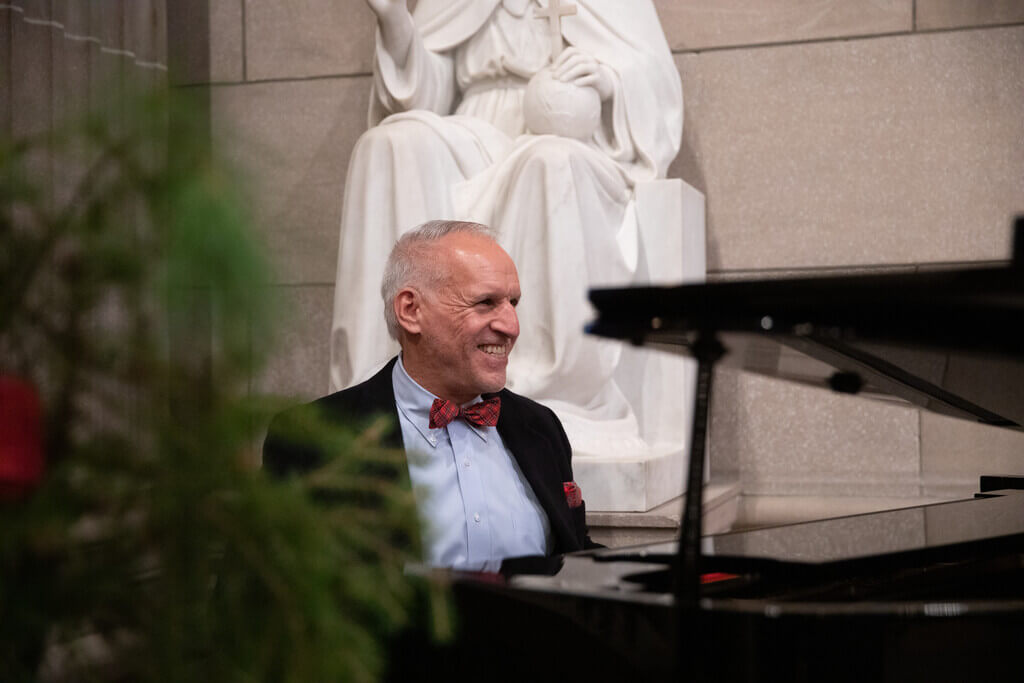
In manner and style, Rosania possesses a sartorial style and aristocratic refinement that you might mistake for Philadelphia Main Line energy. But you’d be wrong. The youngest of three children, Rosania had a modest beginning. His parents, John and Carmela, a postmaster and seamstress, raised Rosania and his older siblings, brother John and sister Lorraine, in Holmesburg, a place whose principal boast is having the country’s oldest stone arch bridge: the Pennypack Creek Bridge. Carmela’s parents, grandfather, Angelo, and grandmother, Gabriella, lived next door. It was Angelo (and his collection of 78s) who would introduce Rosania to legendary Italian opera singers of the 1920s and ’30s, such as Enrico Caruso.
John and Carmela were intent on raising cultured children and cultivating any interests or talents they displayed.
“My parents were really interested in cultivating my whole person,” Rosania said. “My father was a great athlete and made sure I went to the Phillies, the Eagles, the Flyers and 76ers games, but he was also adamant about taking me to the Philadelphia Orchestra and every museum and historical site in the area.”
Rosania pauses, his expression thoughtful.
“But without pushing me towards anything,” he continues, “like, ‘You must become an athlete.’ My parents were just really intent on my being exposed to as much as there was.”
His parents didn’t have to wait long to see where their youngest son’s interests lay. At 9, he won a coveted position in the Philadelphia Boys’ Choir and Chorale, a Grammy-nominated, Emmy-winning group established in the 1960s, which still performs today.
Rosania’s world expanded exponentially.
“Suddenly, I was not only exposed to but working with [boys] from every background, every race, and every color, all together doing something we loved. It taught me an enormous amount right from the beginning about how to work together, how to respect other people, other cultures.”
Rosania was performing not only in New York and New Jersey, but also abroad, singing to packed houses. But if, perchance, audience turnout was less than stellar, only one response would do.
“One evening we entered this school auditorium, I forget where it even was,” Rosania recalls. “There was some glitch in the schedule. I don’t know if the date had gotten messed up or the advertising didn’t go out.”
As showtime neared, only a handful of people gathered in the first row of the 1,000-seat auditorium.
“We were just heartbroken,” Rosania says. “No one’s there to see us. We can’t do it. And I’ll never forget, our conductor said, ‘It does not matter if there are 5,000 people or five people in the audience, the music doesn’t change. You go out; you give it your all.’
“And we went out and sang a full concert,” he continues. “We were so proud. What a life lesson that was. Not only in performing. It was about bringing your best to every situation. Certainly, in music, that performance has guided me ever since. I have had the privilege of performing for thousands of people and of performing for a handful. The music remains the same. I don’t give any less for a few people than for a crowded auditorium at Lincoln Center.”
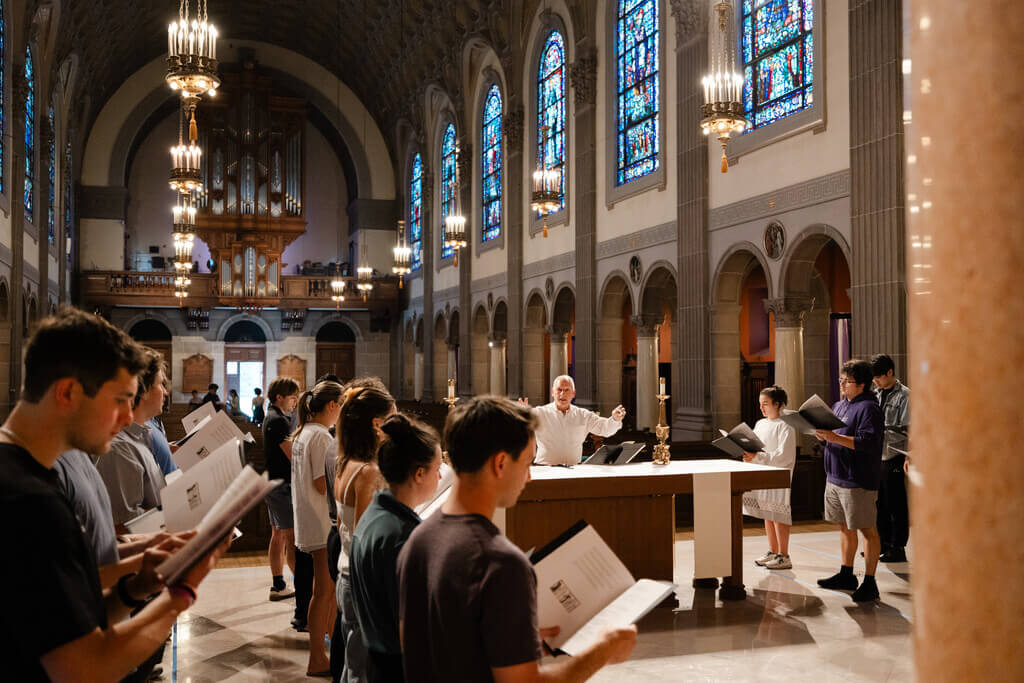
Lesson II: ‘Find a Calcutta close to you’
The country’s bicentennial is the scene of the next major turn in Rosania’s life. At Yale, he’d been drawn to service work. That summer of 1976, Rosania, a rising sophomore, attended the International Eucharistic Congress hosted by the Catholic Archdiocese of Philadelphia. Catholics from all over the world came, including Day and Mother Teresa. Rosania attended speeches given by both women. They were forces, he says, but left distinctly different impressions.
“I remember Mother Teresa brushing past me as she was walking, and I thought, I am in the presence of something extraordinary,” Rosania says. “I don’t know what it was — saintliness, holiness. With Dorothy Day, it was a completely different impression. With her, it was a feeling of tremendous strength, like you were in the presence of a great mountain or something.”
He wrote to Mother Teresa asking if he could come to Calcutta for a year to serve the poor.
“I got a note back from her secretary. It said, ‘Dear Laurence, thank you. Mother Teresa was very touched to receive your note and your request. And she would, of course, welcome you to Calcutta at any time, but Mother asks before you do that you find a Calcutta close to you and work there.”
So he did.
After graduating from Yale in 1979, Rosania went to work at The Catholic Worker St. Joseph House in Manhattan, the community Day founded in 1936.
“We received a $5 a week stipend, a bed in the dormitory with the homeless men, and all the soup we could eat,” Rosania recalls. “It was real poverty. The big treat was that you could still take a subway ride and get on the Staten Island Ferry for a couple of dollars. That was our big day out.”
Rosania began playing the piano and organ for local churches to make extra money. He also grew to know Day, though she’d live only a year after he arrived. Still, she attended Mass and Friday night lectures at the Catholic Worker, Rosania said, and received visitors, which included Mother Teresa in that last year. When Day died, it was Rosania who directed and played at her funeral liturgy, on a modest little electronic Hammond organ in a ramshacked church on Second Avenue, the Church of the Nativity.
“The organ I played on barely made a sound, and the church was kind of falling down, and Dorothy was in the simplest little pine box,” Rosania said, “but everybody was there, from the cardinal to the papal nuncio.”
Rosania left the Catholic Worker after a year and a half to take the position of principal cantor and music associate at New York’s St. Francis Xavier Church. He would spend four years there and then five on the Upper West Side at St. Paul the Apostle Church, as director of music.
Rosania opens a desk drawer and takes out what appears to be black lace.
“I went back to the Catholic Worker some years later and had tea in Dorothy’s room with her dear friend and caregiver,” Rosania says. “She said to me, ‘You should have something of Dorothy’s.’ She gave me this mantilla.”
Rosania shakes his head as he smooths the black lace. “Look at any photographs of her. Whenever she’s at Mass, she wears a black mantilla.
“I was speechless.”
Lesson III: Seek a ‘cultivated life’
On a sunny day in February, students gather in Brooks Concert Hall for Gregorian Chant class, jointly taught by Rosania and Daniel DiCenso ’98, associate professor and music department chair. The popular course culminates in a vespers performance in St. Joseph Chapel. A disproportionate number of nonmajors, many athletes, some with no singing experience, typically take the course, which has been a consistent offering of the music department for eight years. The caliber of the culminating performance is impressive, even by the instructors’ standards.
“It was Laurence’s suggestion that the students sing,” DiCenso says. “I was afraid that including singing with the academic study might scare the students away, but in fact, the singing is the most popular part of the course!
“Laurence is an absolute magician in teaching students who have never sung before to sing Latin chant,” DiCenso added. “His professionalism is also an outstanding quality. Whatever you do with Laurence, it will be a class act. Rehearsals will be well run. Details will be attended to. He is just altogether a consummate professional.”
What the students know of Rosania is anyone’s guess, but what they likely don’t know is impressive. Here's a partial list:
- While at Yale, Rosania starred in a student production of “HMS Pinafore,” opposite his good friend and “Frasier” star David Hyde Pierce (he was just David Pierce back then).
- He played at the wedding of Oscar-nominated actor Timothée Chalamet’s parents, Nicole Flender and Marc Chalamet. Mom is a friend and fellow Yalie.
- Rosania spent several years as a monastic resident in St. Joseph’s Abbey in Spencer, Massachusetts, and at Dai Bosatsu Zendo Kongo-ji, a Rinzai Zen Buddhist monastery in the Catskills.
- He released a music collection, “Works of the Heart,” in 2012. One composition on it, “The Supper of the Lord,” has sold more than 50,000 copies and is easily recognizable by Mass-goers.
- Rosania has played concerts at Lincoln Center, Carnegie Hall and the Brooklyn Academy of Music, and once premiered a composition at the Basilica of the Immaculate Conception in Washington, D.C.
- He once won a Rembrandt etching, “Jesus in the Garden of Gethsemane,” in a silent auction, but sold it after flood waters from Superstorm Sandy nearly destroyed his Chelsea neighborhood.
- The character Laurence Rosania, a Chicago-based jewel thief, appears in New York Times bestselling authors Clive Cussler and Justin Scott’s Isaac Bell series of novels. Rosania and Scott’s wife are Yale classmates. Asked why he envisioned Rosania as a fictional criminal, Scott said, “I wanted someone wonderfully urbane and charming, and he’s a pretty easy model.”
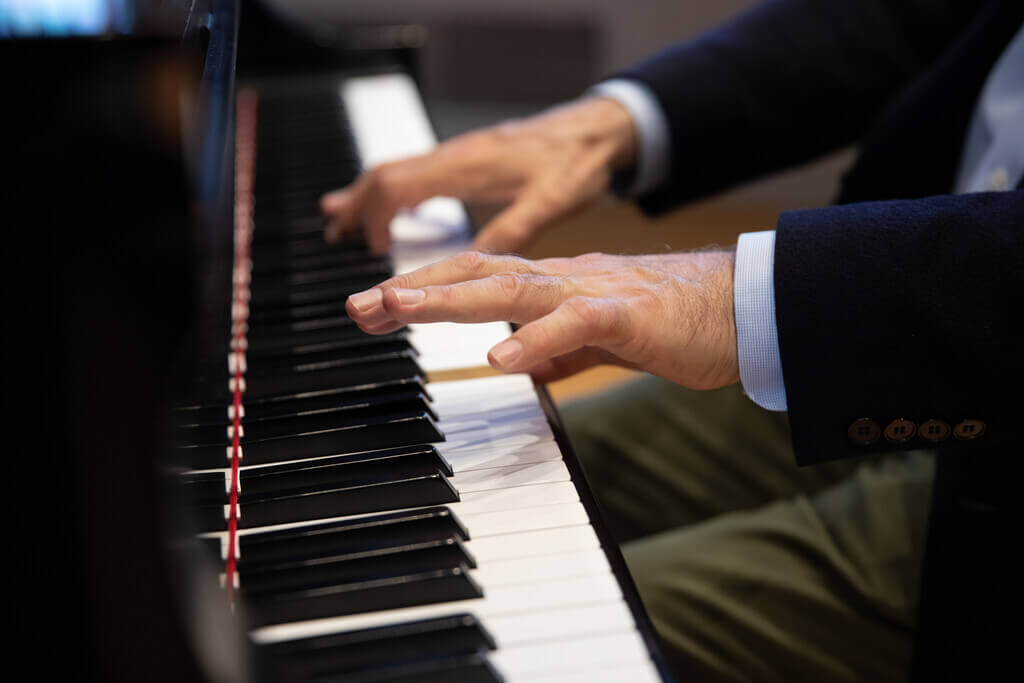
Rosania also confides that he once seriously considered becoming a Jesuit priest. Ultimately, he discovered a religious life was not his calling. Working with students was.
“Ten years ago, I decided that I wanted to refocus my work and, specifically, refocus it in a way that brought together all the varied experiences that I had,” he said. “I thought that there was something of value I had to bring to this new generation, and I wanted to do this in a liberal arts environment.”
Rosania arrived at Holy Cross in 2017.
“I’m very drawn to places that have deep, historic roots, and Holy Cross’s Jesuit connection was very important to me as well, because I had had this long experience of the Jesuits at St. Francis Xavier.”
On a table in his office, next to a copy of that Rembrandt etching he sold, sits a framed photograph of Rosania in Mary Chapel flanked by eight students, five men and three women, all wearing Rosania’s signature neckwear — a bowtie. One year, the students in his Sunday choir decided they’d all be Rosania for Halloween that year. Rosania’s wearing the biggest grin of all.
“He has been a true friend to the music department and one of the strongest advocates on campus for our Brooks and Organ Scholars — and all student musicians,” DiCenso said.
“Laurence is a force of great light,” Gardiner says. “And he brings grandeur, grace and beauty to everything around him.”
Dorothy Day once said, “Don’t call me a saint. I don’t want to be dismissed that easily.” Rosania similarly resists casual categorization. When asked about an overarching philosophy or approach to life, he reaches for the lessons of his childhood and one, in particular: Seek a cultivated life.
“I think we all hope to defy easy labels,” he says. “I have a group of friends — Yale buddies — and we still get together, and a lot of us are still working in publishing and in the arts. And we’re still very much engaged in that question of how you continue to live a cultivated life.
“This is still the priority.”
